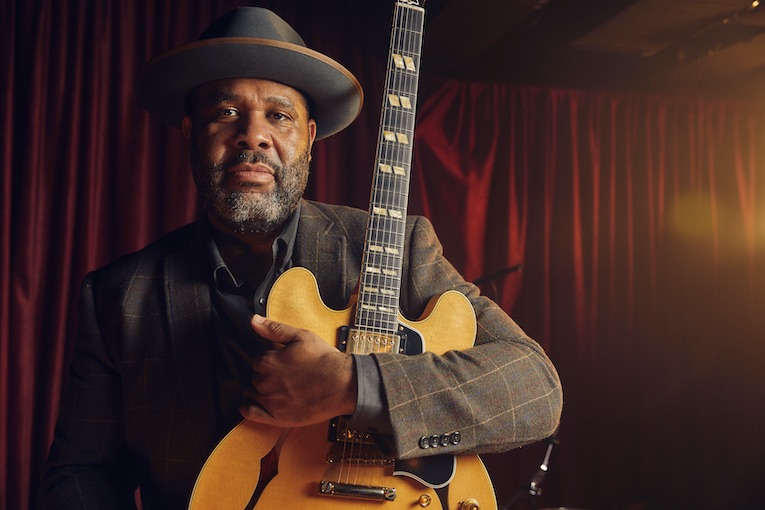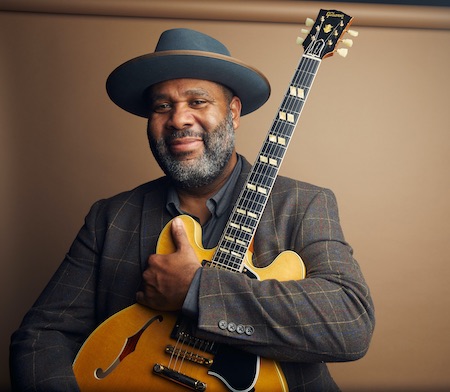
Photo: Kirk Fletcher
Conversation With Kirk Fletcher
By Martine Ehrenclou
Just say the name Kirk Fletcher and you’ll hear high acclaim and respect from critics, peers and fans across the globe. Widely considered one of the finest blues guitarists in the world, Kirk has played, recorded and toured with a variety of renowned artists including The Fabulous Thunderbirds, Joe Bonamassa, Kim Wilson, The Mannish boys, Cyndi Lauper, Charlie Musselwhite, Robben Ford, and Michelle Branch.
With his solo career, Fletcher is regarded as one of the most soulful and masterful guitar players of our time. With the combination of his six-string skills and strong, expressive vocals and insightful songwriting, he blends blues with elements of rock, funk, gospel, jazz and soul with a fresh contemporary spin. His solo discography has been streamed millions of times and he’s earned applause from Guitar World, Guitar Player, Guitar and many others. He is a four-time Blues Music Award nominee.
Fletcher is set to release his seventh full-length album, Heartache By The Pound on July 29th, produced by Fletcher and recorded at the legendary FAME Studios in Muscle Shoals, AL. The album includes Terence F. Clark (drums), Reese Wynans (keyboards), Joe Sublett (sax), Mark Pender (trumpet), Jade MacRae (backing vocals), Randy Bermudas and Travis Carlton (bass.)
Martine: What made you move to Nashville?
Kirk: It’s the first time in my life I’ve ever lived somewhere where they like musicians, where it’s okay to be a musician. It’s actually a place where musicians come. I’ve lived in places like L.A. and it’s weird. It’s gotten weirder over time, as far as a lot of things. I mean, I love L.A. and it’s home, but this is definitely the music city. Very welcoming when it comes to musicians.
Martine: I live in L.A. so I know how weird it’s become, but I don’t know what you mean by weird for a musician.
Kirk: There aren’t that many places to play there anymore. In L.A. now, it’s not really artist-friendly. It seems like it’s just more expensive. Nobody can even afford to have a house in L.A. anymore, as far as I can see. You might have the same $50 gig in LA and how far is that going to go? (Laughs) The cost of living and the traffic. When so many musicians live in a community (Nashville), there’s just a different type thing. But I love L.A., that’s my home.
Martine: So, how’s it going? That’s a big move.
Kirk: It’s going good. I’ve already been doing a bunch of gigs here and meeting loads of people.
Martine: I love your new album Heartache by the Pound. It’s such a good album. Can you tell me about it?
Kirk: I had my heart set on doing a straight traditional Blues record, kind of raw. I started gathering material. But something happened when I started to think about it and take walks. I thought, “Instead of trying to do that, why don’t I try and do the absolute best songs I can do and not think about genre or about anything but just expressing myself.”
Once I had that focus and was hanging out with my dear friend, Richard Cousins (Robert Cray Band), it just took off. My whole direction changed from what I initially wanted to do. I was listening to B.B. King on my walks. He has a song called “Chains and Things.” I thought about the expression and how I could really understand where he was coming from. That inspired me. “Afraid To Die, Too Scared To Live” came out of that inspiration.
It really turned into this thing. After that, I said, “I feel really strongly about these songs in my heart. This is the midlife crisis record. If I could choose any studio in the world, what would it be?” And something about having a goal like that, you just start to put into place what you need to do to achieve that goal. And the mother studio for me is FAME Studios. That’s like, Kirk’s Abbey Road or something. (Laughs) I’d be in good company– Aretha Franklin, The Staple Singers and Wilson Pickett, and all these people recorded there.

Kirk Fletcher
Martine: What was it about that studio aside from all the greats who have recorded there, that made you think this was the right place for you to record this album?
Kirk: That’s a great question, actually. It just felt right. This record was definitely about facing different things in my life, good or bad, the pandemic and everything. At the end of the day, it was about doing everything that your heart desires, because we don’t know what’s going to happen in the next week or the next whatever.
When I went to FAME Studios, it was just magical. Talk about an aura, a vibe. That’s what you’re really probably paying for, is the vibe. (Laughs)
Martine: (Laughs) You must have had that same vibe with your band and the recording also.
Kirk: Absolutely. We had Randy Bermudes who I’ve worked with, Charlie Musselwhite and more. To be able to share that with a dear friend, only made the experience all that much more the better. And Reese Wynans.
Martine: There are a couple of songs on your album where Reese is so in his element.
Kirk: Yeah. I mean, Reese come on. (Laughs) He’s just the man. He has become such a dear friend, and it’s so amazing to have had him on the session. He brought such a positive, hardworking, musicality to these songs.
Martine: How did you move into more rock, soul, gospel and blues direction? Your last album, My Blues Pathway was more blues, funky, jazzy blues.
Kirk: There are certain little things that that we started to develop on My Blues Pathway, but we just took it farther. I feel that I grew from hanging around with Richard because he kind of mentored me in songwriting.”
Martine: (Laughs) Your music is feel-good music. I don’t know if it’s the songs you write or choose, or if it’s the way you sing or play.
Kirk: Thank you so much. The way I feel about music and the kind of music that I like, is that it’s a celebration of all of the influence and inspiration that I’ve had. And I consciously try and go after that, the “feel good.” That’s what music should be.”
Martine: When did you start playing guitar and getting into the blues?
Kirk: Oh man. (Laughs) I started playing guitar when I was about seven or eight years old. My parents would talk about music they listened to when they were young. And that would be B.B. King, T-Bone Walker, Muddy Waters, Bobby Bland. You know, blues people have great names. (Laughs) I mean those names just sound really fascinating to a little kid, well, to me.
Eventually on a local blues station, I was able to hear some of these people that they talked about. The minute I heard it was like just a little harder edge gospel music. To me at that age, it sounded like one and the same. They were talking about their woman or man instead of God. (Laughs) Just rawer. I just loved it since day one.
Martine: Your guitar style is so varied on this record with different tones and feel. Do you figure that out ahead of time before you go in the studio?
Kirk: (Laughs) No, definitely not. That’s the fun! You can’t take the fun away from me. (Laughs) I have to go into studio and totally be right in the moment. I always approach my music like a session musician. “What’s going to be the right thing at that moment to add to this?” I’ll work out my guitar parts on the spot. I take sort of a 70s session player kind of mentality, where you go in, guitar, amp and that’s it. I’m not one of those guys that has a hundred guitars in the studio. I like one or two guitars and one amp. And then I’ll add an effect to taste. If it needs a wah-wah or if it needs a little more delay or reverb or something, I’ll just plug one pedal in one by one and that’s it.
I do sometimes have a pedal board, but a lot of times I’m just a real bare bones kind of guy. And I just feel that I can express myself more musically. The less I have, the more I can express myself.”
Martine: So, it’s really about self-expression for you.
Kirk: Absolutely, because for so long, I was a side man. I’ve always been the kind of person that has been really insecure about a lot of stuff and always sort of nervous to take the reins and stand out front. So now, it’s sort of my time. Self-expression is pretty much the ultimate.
Martine: When you were playing/recording with The Fabulous Thunderbirds, Joe Bonamassa, The Mannish Boys, and others, was that a choice because you didn’t want to be out front?
Kirk: I didn’t even really think about being out front. I mean, I was a side man. I was into just playing, accompanying people and trying to make the music better. It wasn’t even a conscious decision other than, “Hey, this is a gig. This will be fun. I’m going to go out and play.” I didn’t think about out front.
There are things that I even miss about being a side man, because it’s just so fun to be engulfed in guitar parts, and being engulfed in making this whole musical situation better, adding something to it.
Martine: How does it feel now being the front man?
Kirk: Being a front man is a different energy. It’s like you can express yourself with your own songs, play guitar solos, hire interesting bands, and really get yourself out there in that way. It’s incredible both ways, as far as music goes. The business of music being a front man and the logistics and all those things can be very, very frustrating. But the actual pure music part of it, oh man, it’s amazing.
Martine: Who are your strongest musical influences?
Kirk: Hmm. I would say it always goes back to, as far as guitar playing, B.B. King, Otis Rush, Larry Carlton, Robben Ford, people like that. The marriage between Chicago Blues and the Los Angeles West Coast 70s, 335 camp. Also Chris Cain, people like that. It’s always a mix of those two. But you know, I’m a funk guitar player too. I played a lot of funky music growing up. The rhythm is always just as strong as the lead for me, or I want it to be just as strong as the lead.
Martine: It absolutely is. There’s groove in every single one of your songs.
Kirk: Thank you so much. That’s the real thing. What I wanted to achieve when I was very, very young, was to be able to solo like B.B. King, Albert King, all of these people, and be able to play rhythm like their rhythm guitar players. I wanted to be just as good of a rhythm guitar player as I was a lead player. And that was definitely a conscious effort, to not be either or.
For more information about Kirk Fletcher see his website Here.
Watch “Afraid To Die, Too Scare To Live”

Thank you , Martine for the excellent interview of one of my favorite guitarists and singers! Love the sample video! It sounds so good. i’ll have to get this album!
https://youtube.com/shorts/KjMZINUE2-w?feature=share